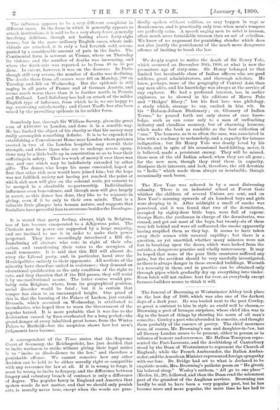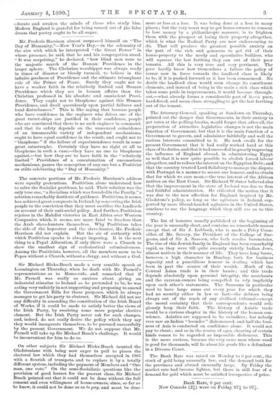The funeral of Browning at Westminster Abbey took place on
the last day of 1889, which was also one of the darkest days of a dark year. He was buried next to the poet Cowley, as great a contrast to him in style as could well be chosen,— Browning a poet of brusque surprises, whose chief idea was to dig to the heart of things by showing his scorn of all man's conceits ; Cowley a poet who abounded in conceits, and thought them probably of the essence of poetry. The chief mourners were, of course, Mr. Browning's son and daughter-in-law, but all literary London strove to be present, either in person or in tributes of honour and reverence. Mr. Hallam Tennyson repre- sented the Poet-Laureate, and the Archbishop of Canterbury stood by the Dean of Westminster to represent the Church of England; while the French Ambassador, the Italian Ambas- sador, and the American Minister represented foreign sympathy with our loss. Dr. Bridge had set to what is declared to be exquisite music, Mrs. Browning's pathetic poem on "He giveth his beloved sleep." Wesley's anthem, " All go to one place " (Eccles. iii., 20), followed, and then the Dean read the solemnest part of the grandest of the Anglican services. Browning can hardly be said to have been a very popular poet, but he has become more and more popular, the more time he has had to
educate and awaken the minds of those who study him. Modern England is grateful for being roused out of the false dream that poetry ought to be all sugar.















































 Previous page
Previous page